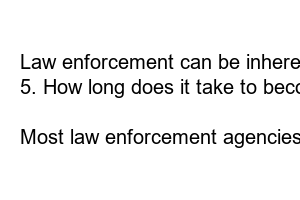경찰이 되는 방법
Title: How to Become a Police Officer: A Comprehensive Guide
Introduction:
Are you passionate about keeping your community safe and serving your fellow citizens? Becoming a police officer may be the perfect career path for you. In this article, we will provide you with a step-by-step guide on how to pursue this noble profession.
1. Understand the Requirements:
Becoming a police officer demands certain qualifications, which may vary in different jurisdictions. To begin, you typically need to be at least 18 years old, possess a high school diploma or GED, and be a U.S. citizen. Understanding the specific requirements in your area is essential, so conduct thorough research or consult with your local law enforcement agency.
2. Obtain Relevant Education and Training:
While a college degree in criminal justice or a related field is not always mandatory, it can give you a competitive edge and enhance your knowledge of the law enforcement system. Training programs, like police academies, are also available, providing you with the necessary skills, physical training, and knowledge required for the job.
3. Clear Background Checks:
A spotless background is crucial in law enforcement. Aspiring police officers undergo thorough background checks, including criminal record searches, financial history screenings, and character assessments. Maintaining a clean record and making responsible life choices are imperative to increase your chances of success.
4. Ace the Entry Exams:
To join the police force, you will need to pass several exams, such as written tests, physical fitness assessments, and psychological evaluations. Prepare diligently by studying relevant materials, staying physically fit, and maintaining a healthy mindset to perform your best and secure a coveted spot in the police academy.
5. Complete the Police Academy:
Once you have successfully passed the entry exams, you will be required to undergo specialized training at a police academy. This comprehensive program equips you with essential knowledge in areas such as criminal law, self-defense tactics, emergency response, and community policing. Completing the academy prepares you for the responsibilities and challenges of being a police officer.
6. Apply and Go Through the Hiring Process:
After graduating from the police academy, you can start applying to law enforcement agencies. The hiring process typically involves submitting an application, attending interviews, undergoing additional background checks, and often a polygraph examination. Your physical fitness, mental preparedness, and interpersonal skills will be closely evaluated during this stage.
7. On-the-Job Training:
Upon being hired, you will undergo on-the-job training, also known as field training. This period allows you to put your knowledge and skills into practice under the guidance of experienced officers. During this time, you will gain valuable insights into the day-to-day responsibilities of a police officer and further refine your abilities.
Summary:
Becoming a police officer is a rewarding journey that requires dedication, hard work, and the commitment to serve and protect your community. By fulfilling the necessary requirements, obtaining relevant education and training, and demonstrating exemplary character, you can embark on this noble profession. Remember, being a police officer is not just a job; it’s a calling to make a profound positive impact in the lives of those around you.
FAQs:
1. Are there any height or weight requirements for becoming a police officer?
While some agencies may have specific height and weight requirements, many have discontinued such restrictions. Focus on maintaining a healthy lifestyle and meeting the physical fitness standards set by your local law enforcement agency.
2. Can I become a police officer if I have a criminal record?
Certain criminal offenses may disqualify you from becoming a police officer. However, this varies by jurisdiction and the type of offense committed. It’s best to consult with your local law enforcement agency to understand their specific guidelines.
3. Can women become police officers?
Absolutely! Law enforcement agencies actively encourage and welcome women to join their ranks. Women are an integral part of the police force and contribute to the diversity and strength of the profession.
4. Is being a police officer dangerous?
Law enforcement can be inherently risky. However, with proper training, equipped gear, and experience, officers can minimize the potential risks involved in their daily duties.
5. How long does it take to become a police officer?
The time required to become a police officer can vary. From completing the necessary education and training to the hiring process and academy training, it can take anywhere from several months to a couple of years.
6. Can I become a police officer with tattoos?
Most law enforcement agencies have specific policies regarding visible tattoos. While some agencies have strict restrictions, others may allow visible tattoos as long as they are not offensive or gang-related. It is advisable to review the tattoo policies of agencies you are interested in.

